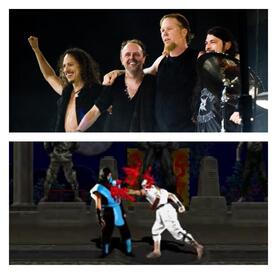 by Preston Tolliver I was fortunate to grow up on a healthy diet of video games and heavy metal. As a young lad who wasn’t really interested in the outdoors, my weekends were spent spinning through walls as Sonic the Hedgehog, or fighting monsters in “Final Fantasy.” As I got older, my taste in games became more violent, more macabre, along with my tastes in music: “Mortal Kombat” and Metallica; Pantera and “Call of Duty;” Slayer and “Doom.” Where a lot of people find comfort in books, I always drifted toward video games; similarly, where many children find their best friends on the football field or basketball court, my friends and I spent days and nights beating each other up with controllers in hand. My love of video games of heavy metal music came with a cost of accepting the stigma that surrounded them. I remember the news reports following the Columbine school shootings – the reports centered on the music of Marilyn Manson, and around first-person shooters like “Doom,” both used as ammunition in an argument to take the focus off the real-world dangers of American gun culture. That stigma hasn’t gone away, as evident by certain politicians and news pundits trying to place the blame of recent acts of terrorism on the feet of the video game industry (and in the case of 24-year-old Connor Betts, who killed nine in Dayton, Ohio, many have blamed heavy metal music). It’s a tired argument, one that I would have hoped faded away with the complete lack of evidence to support it in the last couple of decades. Sure, the occasional mosh pit at a metal show may see some person get their lights knocked out (it is an occupational hazard of going to a metal concert), and many video games do specialize in the grotesque and gory. But I’ve always found more unity in both of those things than division. More than unity, I’ve found that the escapism of video games and music is a blessing, a deterrent from a real world that brews real violence. The real world is ugly: racism is real, and hatred toward people of different races, religions and lifestyles is pedaled by politicians and our president. To blame imaginary worlds in which players shoot pixels on a screen more than the white nationalists who spew anti-immigrant propaganda and an organization that funnels millions of dollars to ensure that everyone has the simplest access to firearms is not only ignorant, it’s abhorrent. The blame for shootings – such as the ones that have splintered the communities in El Paso, Texas and Dayton – rest at the feet of politicians who are more willing to take money than action, a culture that continues to permeate bigotry and racism, and the figureheads who bask in it. It rests on the legislators who refuse to hear any discussion on gun reform so that they and their campaigns may continue profiting from the National Rifle Association (there’s a reason you don’t see Nintendo funneling millions of dollars into Washington), and those who paint minorities and immigrants as threats to our country and our way of life. The real world is ugly, to an almost unbearable point. I’ll be spending my afternoon today escaping it for a world in which I’m an expert sharpshooter, equipped with more firepower than I believe should be legally allowed in real life. But I’ll enjoy playing it, and my thirst for blood won’t go beyond the game. As usual, I’ll be relieved to enter a violent world that’s somehow more comforting than the one outside.
0 Comments
Leave a Reply. |
Archives
July 2024
|